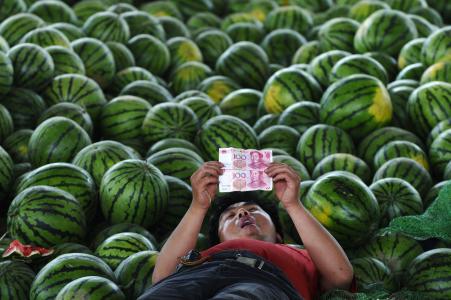By Duncan Hewitt -
SHANGHAI -- A major milestone in the opening of China’s economy, or a purely symbolic gesture with little real significance? Both reactions were in evidence in China Tuesday, after the International Monetary Fund (IMF) voted to include the country’s currency, the yuan, in its Special Drawing Rights (SDR) basket of currencies -- used to guarantee loans to IMF borrowers -- from Oct. 1 next year.
Mainstream media and some international analysts said the move would boost the internationalization of the Chinese currency: “A historic moment, which has stirred debate around the world,” said the populist tabloid Global Times, while Shanghai’s Oriental Morning Post, which filled its front page with the story, stressed that the yuan’s 10.92 percent share of the basket was “higher than the Japanese yen and the British pound.” Overtaking such global currencies clearly excited some: “I stayed up half the night for the news – let’s celebrate," said a commenter on online news site The Paper, while another added, "This is a symbol of global acknowledgment of China’s economic development."
And some international observers agreed. Analysts at HSBC in Hong Kong wrote in a research note that the move was a “key milestone” for the internationalization of the yuan, "which should increasingly be looked upon as a ‘major currency.'"
Yet there was also some debate about the significance of taking up a small proportion of a basket which as a whole -- as even the Global Times acknowledged -- accounts for only 2.5 percent of global foreign exchange reserves. Andy Xie, a Shanghai-based analyst who was formerly chief economist for Asia at Morgan Stanley (N:MS), was dismissive: “The SDR is just an accounting unit, this has no real world significance,” he told International Business Times. Xie suggested that the move was primarily a publicity coup for the Chinese government aimed at “convincing Chinese people not to buy dollars,” at a time when the country has seen significant outflows of currency following its surprise devaluation of the yuan in August.
Some members of the public were cynical too. One commenter on The Paper suggested that the yuan's proportion of the SDR was actually lower than some experts had predicted, and another questioned whether the Chinese currency really met IMF standards of being “freely tradable and convertible," asking: “Can we really freely use it abroad? It seems there are limits.” It was a reference to the regulations that limit Chinese people to converting only $50,000 worth of yuan into foreign currencies each year, while the government has also recently introduced new rules limiting ATM withdrawals by Chinese citizens while overseas.
And even an op-ed piece in the Global Times’ English-language edition suggested there should not be “excessive expectations” about the significance of the event, which it said was “unlikely to substantially increase the proportion of the yuan in global reserves.” It said that the key to whether foreign central banks, and others, would put their money into a currency was the credibility of that currency and the economy of the country that issued it. It noted that the “use of the Japanese yen as a reserve asset has actually fallen since it was included in the SDR basket.”
“Further financial reforms are still essential for it [the yuan] to become a global currency," the article added. However it stressed that China’s leaders understood this, and a statement from China’s central bank said the IMF's decision would encourage China to “continue to deepen and accelerate economic reforms and financial opening up.”
Indeed some analysts have said that international support for the IMF's move is designed in part to boost Chinese reformers keen to open the country's economy, including its stock and bond market, to foreign investors. The South China Morning Post also quoted leading brokerage China International Capital Corporation (CICC) as saying the yuan's inclusion in the SDR was part of an “irreversible push towards financial liberalisation, which will have a profound impact on China's economy." The China Daily, meanwhile, quoted one expert as saying China’s central bank would now “come under immense pressure to be more transparent, and improve its way of communicating with international markets,” following criticisms of its handling of the devaluation of the yuan earlier this year.
Li-Gang Liu, chief economist for Greater China at ANZ Bank in Hong Kong, said in a note that the yuan’s entry into the SDR was “unlikely to bring significant fund inflows in the near term, but we believe overseas investors will increase their assets allocated in CNY bonds over the longer term." Meanwhile HSBC analysts said the IMF’s decision would boost confidence and usage of the yuan because it “serves as a sign of quality assurance for global users that the currency in question is very liquid and is stable as a store of value.”
The HSBC report also predicted that the move would boost reform efforts in China, and would give the nation's leaders "further confidence to let the exchange rate become more market driven,” saying this could be the "most important result" of the IMF’s decision.
HSBC predicted the central bank would likely allow the yuan to trade in a slightly wider band against the U.S. dollar than its current range of +/- 2 percent a day, though it said that in the short term this could lead to “some further depreciation pressure” on the yuan. Noting that the U.S. Federal Reserve may raise interest rates this month, which would likely encourage more Chinese investors to put money into dollars, it predicted the yuan could fall to about 6.5 to the dollar by the end of the year, from its current level of about 6.35 and said "more weakness with greater two way volatility" could be expected next year.
